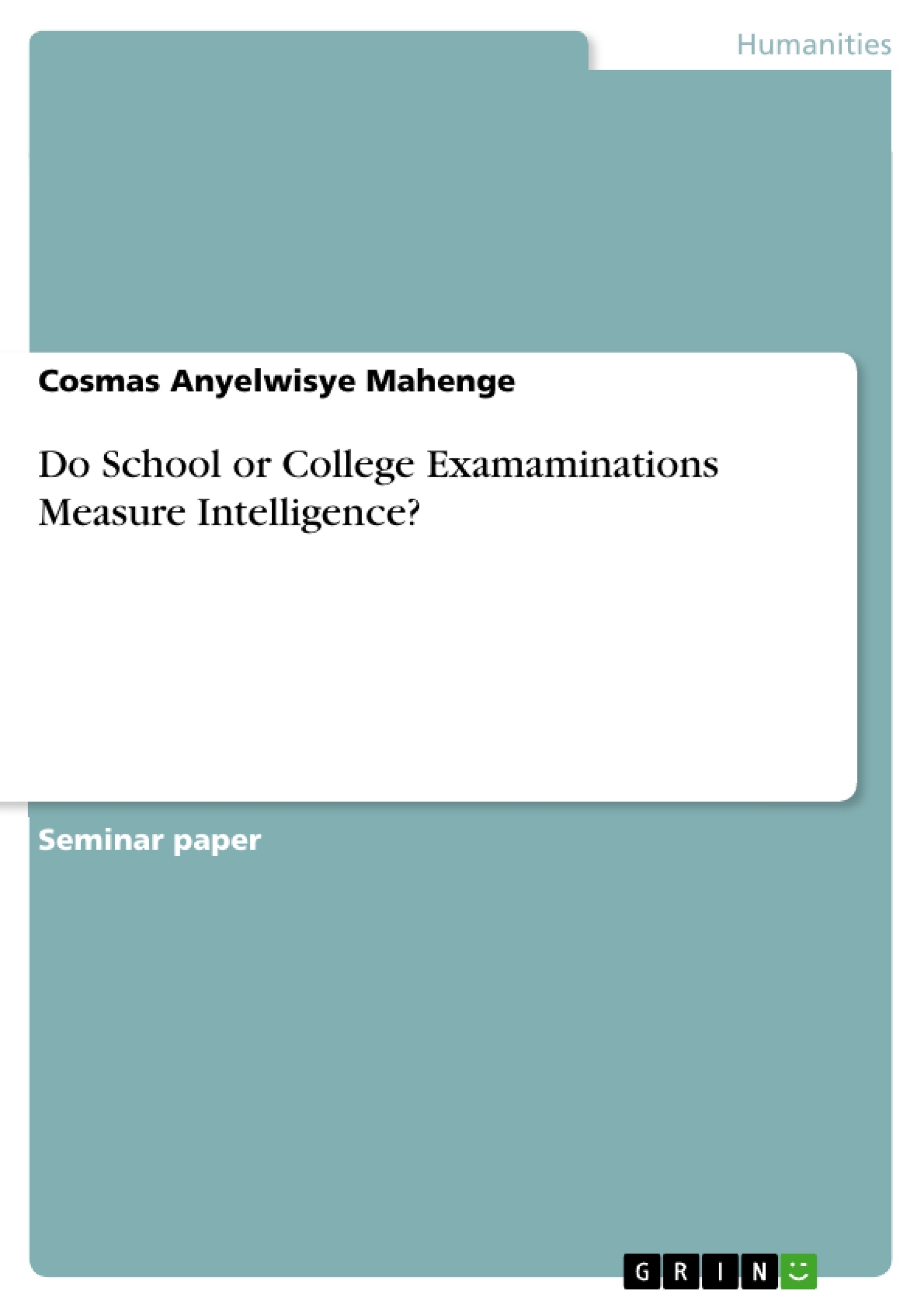This paper discusses about intelligence by looking specifically on whether school and college examinations measure intelligence or not. In addressing the issue, the paper starts by conceptualizing intelligence and its types. It then goes further by showing whether school and college examination measure intelligence or not and showing how intelligence is measured and finally it ends by showing the distinction between intelligence and academic performance which are the two distinct terms that have been equated wrongly.
Abstract
This paper discusses about intelligence by looking specifically on whether school and college examinations measure intelligence or not. In addressing the issue, the paper starts by conceptualizing intelligence and its types. It then goes further by showing whether school and college examination measure intelligence or not and showing how intelligence is measured and finally it ends by showing the distinction between intelligence and academic performance which are the two distinct terms that have been equated wrongly.
Conceptualizing Intelligence
The term Intelligence is derived from the Latin verb intellegere; which means “to understand”. Despite a long history of research and debates, there is still no standard definition of intelligence. Eysenck (2004) argues that there has been more controversy about research in intelligence than almost any other area within psychology. Wechsler (1944) defined intelligence as the aggregate or global capacity of the individual to act purposefully, to think rationally, and to deal effectively with his environment. Feuerstein (1990) defined the term as the unique propensity of human beings to change or modify the structure of their cognitive functioning to adapt to the changing demands of a life situation. According to AllWords Dictionary, intelligence is the ability to use memory, knowledge, experience, understanding, reasoning, imagination and judgement in order to solve problems and adapt to new situations.
Generally, despite the multitudes of ways in which intelligence is conceptualized, the following components are identified as central to the phenomenon: intelligence involves the ability to reason, plan, solve problems, think abstractly, comprehend complex ideas, learn quickly and learn from experience. Although there is no single standard definition of intelligence, if one surveys many definitions will find that there is a strong similarities between those definitions. In many cases different definitions actually say the same thing but in different words.
Types of Intelligence
Howard Gardner (1983) identified eight distinct types of intelligence in his Multiple Intelligences Theory in the book "Frames of Mind." He said there are at least eight ways that people have of perceiving and understanding the world. Gardner labels each of these ways a distinct intelligence in other words, a set of skills allowing individuals to find and resolve genuine problems they face. These types include musical, bodily kinesthetic, logical-mathematical, linguistic, spatial, interpersonal, intrapersonal, and naturalistic intelligences.
1. Musical intelligence: the ability to perceive, concentrate on, discriminate, respond to, and produce music e.g. a music critic, a composer, or singer.
2. Bodily-kinesthetic intelligence: the ability to make physical movements and motor coordination e.g. an actor, an athlete, or a dancer
3. Logical-mathematical intelligence: the ability to use numbers effectively and to reason well e.g. mathematician, tax accountant, or statistician.
4. Linguistic intelligence: The capacity to use words effectively, whether orally or in writing e.g. storyteller, orator, politician, a poet, playwright, editor, or journalist
5. Spatial intelligence: The ability to perceive the visual-spatial world accurately and to perform transformations upon those perceptions e.g. an architect or artist.
6. Interpersonal intelligence: The ability to perceive and make distinctions in the moods, intentions, motivations, and feelings of other people.
7. Intrapersonal intelligence: Self-knowledge or the ability to act adaptively on the basis of that knowledge.
8. Naturalistic intelligence: The ability to easily recognize and classify plants, animals, and other things in nature.
Do Schools and College Examinations Measure Intelligence?
The response to this statement is absolutely no, school and college examinations do not measure intelligence rather they measure academic achievements of a student. These examinations are sometimes referred as attainment tests which are the tests that measure what a person has achieved after a specific training.
Frequently asked questions
What is the main topic of this text?
This paper discusses intelligence, specifically whether school and college examinations measure intelligence or academic achievement.
How is intelligence defined in this text?
The text explores various definitions of intelligence, highlighting its components such as reasoning, planning, problem-solving, abstract thinking, comprehending complex ideas, quick learning, and learning from experience. It acknowledges the lack of a single, universally accepted definition but emphasizes the commonalities across different interpretations.
What are the different types of intelligence, according to Howard Gardner?
Howard Gardner identified eight distinct types of intelligence: musical, bodily-kinesthetic, logical-mathematical, linguistic, spatial, interpersonal, intrapersonal, and naturalistic.
What are examples of musical intelligence?
A music critic, a composer, or singer are examples of musical intelligence.
What are examples of bodily-kinesthetic intelligence?
An actor, an athlete, or a dancer are examples of bodily-kinesthetic intelligence.
What are examples of logical-mathematical intelligence?
A mathematician, tax accountant, or statistician are examples of logical-mathematical intelligence.
What are examples of linguistic intelligence?
A storyteller, orator, politician, a poet, playwright, editor, or journalist are examples of linguistic intelligence.
What are examples of spatial intelligence?
An architect or artist are examples of spatial intelligence.
Do school and college examinations measure intelligence, according to this text?
No, according to the text, school and college examinations do not measure intelligence. They measure academic achievements or attainment, reflecting what a student has learned after specific training.
What do school and college examinations measure?
School and college examinations measure students' learning or achievement in a particular set of knowledge. They also assess the effectiveness of teachers' instruction, indicated by student performance on the exams.
What is the relationship between intelligence and academic performance?
The text emphasizes that intelligence and academic performance are distinct terms that are often wrongly equated. Examinations measure academic performance and not intelligence.
- Quote paper
- Cosmas Anyelwisye Mahenge (Author), 2010, Do School or College Examaminations Measure Intelligence?, Munich, GRIN Verlag, https://www.grin.com/document/191399



